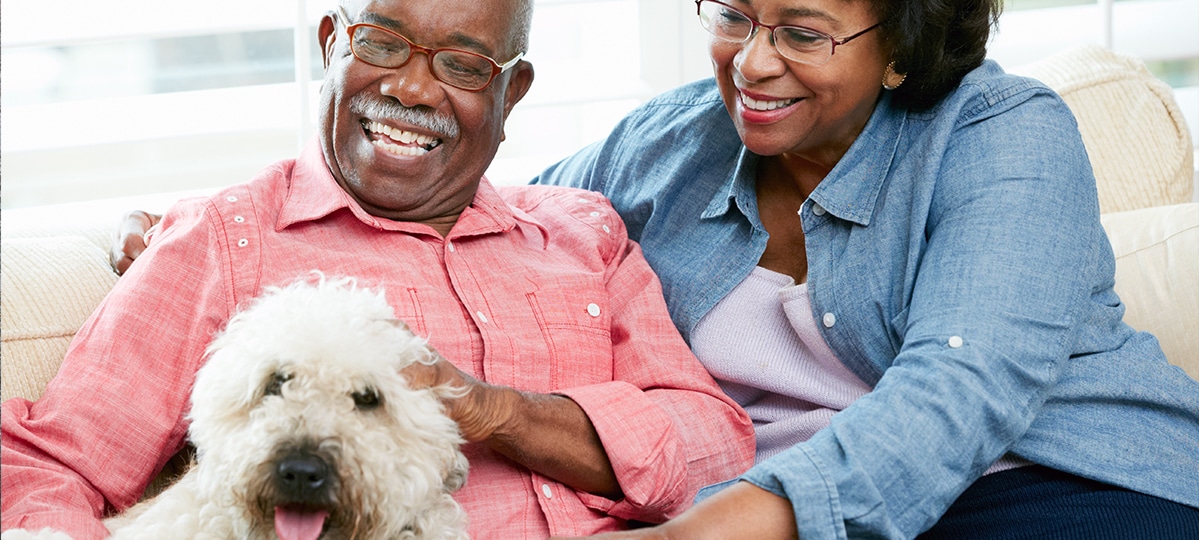Let’s face it, as we grow older; loneliness seems to creep in at an alarming rate. According to the data provided by the latest National Poll on Healthy Aging, one in three senior adults are lonely. Although loneliness is considered to be part and parcel of the aging process, it has been shown to have some negative impact on human health. Various studies have proved that lonely seniors are more likely to have an increased risk of heart attack, depression, stroke, and early death.
We are sure that families and caregivers can’t provide seniors with the type of companionship they deserve at all times. However, one of the best ways to help senior adults overcome solitude and social isolation and provide a sense of emotional connection and companionship is by getting them a pet. Various studies have shown that the bond between senior adults and pets can bring forth several health benefits. This article looks at some of the benefits and challenges of owning a pet as a senior citizen.
Benefits of Having a Pet as a Senior
Since having a pet increases physical activity, social interaction, and emotional well-being, it can predispose some health benefits for seniors. These include:
Physical Health
Having a pet can significantly improve a senior’s physical health. The interaction between a domesticated animal and a senior adult can lead to improved mobility, longer life, and healthier blood pressure.
Ways in which pets improve senior adult’s physical health:
- Increased longevity – Research indicates that the risk of death for people aged 40-80 is 33% lower when they own a dog than when they’re living alone.
- Owning a dog has proven to improve recovery rates for seniors who have had a heart attack.
- Walking the dog helps lower obesity and reduce mass index, thus improving mobility.
- The American Heart Association discovered that individuals who own pets later in life have lower blood pressure.
- They help ease the pain – Seniors who own pets show a significant reduction in pain and emotional distress when they are ailing or after undergoing surgery.
Emotional and Mental Well-being
Social isolation has been known to cause depression, which, in turn, makes conditions such as dementia and Alzheimer’s more severe. However, owning a dog ushers in some emotional stability, thereby alleviating loneliness and improving mental balance.
How pets improve emotional and mental health:
- They help seniors start conversations and, hence are excellent facilitators of social interactions.
- They lower stress, boost self-esteem, and build confidence.
- For seniors with dementia and Alzheimer’s, pets help to calm their side effects such as stress and agitation.
- They help curb loneliness. Since time immemorial, dogs have been human’s best friend, and they are a great companion for seniors up to date.
Creating a Routine
Since pets, such as dogs, need to be catered for at all times, they provide seniors with a sense of purpose, helping them create a routine. When seniors are eager to do something daily, they find meaning in life. Caring for a dog establishes a sense of purpose and, in turn, leads to stress-free living. Walking, feeding, playing, or grooming a dog creates a routine and helps seniors shun solitude and stay alert.
A properly Trained Dog can Help Seniors Perform Specific Tasks
For veterans or senior adults with impairment, dogs can prove to be very handy. Therapy and service dogs provide companionship, but they are trained to perform various tasks such as:
- Picking up deliveries
- Opening and closing doors
- Alerting others in case of emergency
- Retrieves items from areas that most seniors can’t.
Risks and Challenges of Having a Pet as a Senior
While pets may come with many benefits, studies have shown that pets can be risky too, especially when they are in the company of a senior citizen.
Pets Can Cause Injury
Since most seniors are likely to have mobility and balance issues, they are prone to tripping caused by dogs feeding bowls, beds, or ropes. Additionally, those who are allergic to dander can experience some form of allergic reaction. According to a recent study, the number of bone fractures related to seniors walking a dog doubled between 2004 and 2017.
Owning a Pet Can be Expensive
With the American Society for the Prevention of Cruelty to Animals putting the average annual cost of catering for dogs at $875, this can be a lot of scratches for people living on a pension. If you are experiencing financial constraints, family members may discourage you from getting a pet since you might decide to spend money reserved for your care to feed the dog.
Pets can be Very Demanding
Dogs need to be routinely taken to the veterinary for examination and treatment. It might be impossible for seniors to keep veterinary appointments and make their frequent visits to their doctor. Considering the senior’s compromised immune system, a professional must examine pets to see if they carry viruses, bacteria, fungi, parasites, and fungi.
Final Verdict
Although owning a pet comes with a wide range of benefits for seniors, it is also important to remember that animals also require significant investment and lots of time and energy. Therefore, before you decide to get your senior a dog, make sure you consider both the risks and benefits. If you find out that it is more advantageous for your loved one to have a pet, you can consult one of the many adoption programs in the market.




